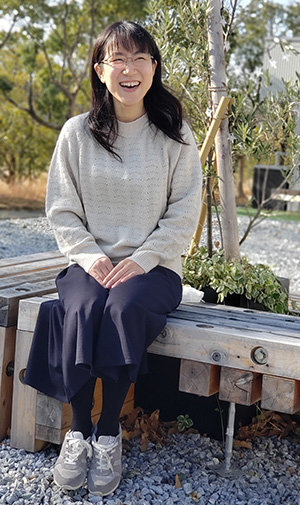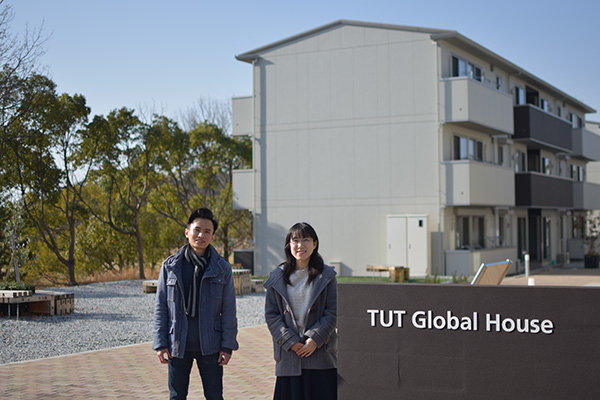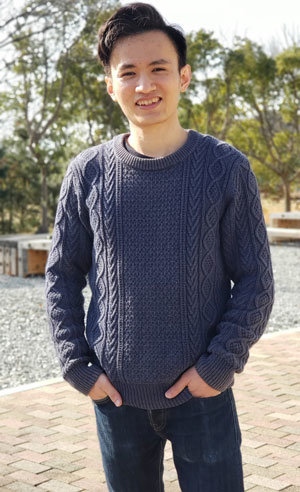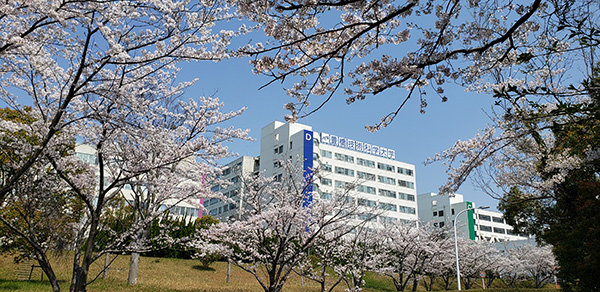Career Paths

Alumni from our university have been recognized as practical and leading engineers possessing high level of technology and science skills at many companies both in Japan and in foreign countries. Their skills gained at this university have been highly evaluated in the business sector as well as research & development fields in cutting-edge technological science.
The employment rate for student who wants to apply for a job is 100 percent, and the technology achievement in this university is admired highly from any industry.
Global Technology Architects Course Interview with the first graduates
Contributing to society through the development of medical devices
Chinatsu Kawakami
Integrated Biosensor/MEMS/group, Electrical and Electronic Information Engineering
(Scheduled to Graduate in March 2021)
Diving into different cultures on your own with the dream of working on the global stage
From the time she was a student at KOSEN (National Institute of Technology), Chinatsu Kawakami wanted to have a job that contributed to society in the future. She dreamed of using her knowledge of mechanical and information systems to work on the development of medical devices that would help with the early diagnosis of disease, the prevention of infections, and so on. "I've personally been taken care of in hospital, so I want to help people suffering from disease or injury, in part as repayment for that. I was surprised when I found out that in developing countries many people die from diseases they would have been saved from in Japan. If developing countries had access to cheap, compact and user-friendly medical devices, it would eliminate some of the disparity in healthcare. That's why I sought advice from a teacher at KOSEN (National Institute of Technology) and decided to study Micro Electro Mechanical Systems (MEMS) at Toyohashi University of Technology," says Chinatsu.
Additionally, to become an engineer who can operate on the world stage, including in developing countries, she selected the Global Technology Architects Course (GAC). Chinatsu enrolled in the inaugural class of GAC and experienced living at Global House. "There were five of us living together in one unit, two Japanese including myself, two foreign students from Malaysia, and one from Vietnam. I'd studied in advance about some of the cultural differences. For example, the Malaysian students are Muslim and can only eat Halal foods. But one time, I made the huge mistake of accidentally using their pot to cook. I immediately went out and bought a new one and apologized, but I had hurt their feelings and I had to seriously reflect on my lack of awareness."
 On the other hand, living together made it a great opportunity for the foreign students to learn Japanese, and the Japanese students to learn English. The friendships she formed through that communication will become a valuable asset when she is active on the global stage in the future, explains Chinatsu. "However, the foreign students were really fluent in Japanese so I tended to speak to them in Japanese. To address this, for five months from January of my fourth year of studies to June of the first year of my Master's course, I studied abroad at KAIST in South Korea, in order to put myself into an environment where I only spoke English. To be honest, I was quite anxious about going to South Korea amid the strained relations between Japan and South Korea over issues such as conscripted workers. But seeing the country from the outside is vastly different from the inside, and everyone was really friendly. At first it was tough for me to speak with my poor English, and I spent every day looking at a PC monitor or through a microscope, but I pulled myself together and from the second month onward I started to initiate conversations with people and gradually each day become more enjoyable. I have fond memories of going to a K-Pop concert with my Dutch roommate and her friends in between research responsibilities," recounts Chinatsu.
On the other hand, living together made it a great opportunity for the foreign students to learn Japanese, and the Japanese students to learn English. The friendships she formed through that communication will become a valuable asset when she is active on the global stage in the future, explains Chinatsu. "However, the foreign students were really fluent in Japanese so I tended to speak to them in Japanese. To address this, for five months from January of my fourth year of studies to June of the first year of my Master's course, I studied abroad at KAIST in South Korea, in order to put myself into an environment where I only spoke English. To be honest, I was quite anxious about going to South Korea amid the strained relations between Japan and South Korea over issues such as conscripted workers. But seeing the country from the outside is vastly different from the inside, and everyone was really friendly. At first it was tough for me to speak with my poor English, and I spent every day looking at a PC monitor or through a microscope, but I pulled myself together and from the second month onward I started to initiate conversations with people and gradually each day become more enjoyable. I have fond memories of going to a K-Pop concert with my Dutch roommate and her friends in between research responsibilities," recounts Chinatsu.
Striving to develop medical devices beneficial to people's health
At KOSEN (National Institute of Technology), Chinatsu's major was actually mechanical control and information system engineering, and as she switched her major to electronics and electricity when transferring, it was quite tough at first.
"When I was in my third year of studies, I was under pressure with classes and turning in assignments, and there were times I spent all day in the library and wondered if I could even get three hours of sleep a night. When I became a fourth year I became busy with research, and it was a shame that I couldn't spent much time at Global House," she says.
However, her efforts were rewarded, and in research into hydrogen ion image sensors, she developed a method for fabricating a structure that inhibits ion diffusion, which had been causing problems, and successfully achieved high-definition imaging. She also worked on the fabrication of a device that performs high-definition imaging of multiple neurotransmitters. Additionally, at KAIST where she studied abroad, Chinatsu conducted research into cutting-edge optogenetics. Optogenetics is a technique to control the functioning of cells using light. Chinatsu fabricated the μ-size LED probe required for this technique using a 3D printer, achieving results in the short time of just five months.
In March 2021, Chinatsu will complete her master's degree and start working at Shimadzu Corporation from April.
"Shimadzu is a manufacturer that deals with analysis equipment and medical devices, and it is also a company that has expanded overseas, which brings me one step closer to my dream. I am particularly interested in developing equipment for the very-early diagnosis of Alzheimer's disease. I actually used to live at home with my grandmother who required nursing care, and also worked part time at a special nursing home for the elderly. Through these experiences, I realized that a long and healthy life is essential for living with dignity. By developing things like medical devices, I want to contribute to the health of as many people as possible."

Self-initiated efforts to overcome cross-cultural barriers
Lim Jia Yen
International Urban Planning Laboratory, Architecture and Civil Engineering
(Scheduled to Graduate in March 2021)
Proactively improving an unsatisfied life in GAC
Malaysian-born Lim Jia Yen first came to Japan in 2012. Following the Great East Japan Earthquake, he visited the disaster-affected area and heard from the local residents about their thoughts on the recovery. He was impressed by the positive attitudes of the Tohoku people in their determination to rebuild despite suffering enormous damage. "I wanted to study abroad because I have an interest in world history, geography and the lifestyles and cultures of each country's people, and I hoped to study in Japan because of its vast experiences among Asian countries in going through economic growth, stagnation, repeated natural disasters and recoveries," says Jia Yen.
He then went on to study at Toyota National College of Technology under a government scholarship program, and upon graduation entered the first class of GAC. Having the similar reason as Chinatsu Kawakami, he chose GAC because he wanted to contribute to solving global social issues and believed that living at the Global House would provide for that in the future. "But at first, it was different from what I had expected. When I first enrolled everyone in the share house was Japanese except me, and we each had our own styles in our daily life. I then found it difficult to communicate, partly because I tended to be passive. In the beginning I was a bit upset, but I realized that leaving things the way they are is not beneficial, so I made a proactive effort to engage with people."
 Eventually, he stepped out and started to involve in the on and off-campus activities, and expand his networks with various international groups. During his fourth year of bachelor's studies, he brought fellow GAC students together and organized the on-campus TEDxToyohashiUT and International Understanding Forum (IUF) to improve cultural understanding and English presentation skills. Presentations and workshops by different speakers each time were organized. Jia Yen also gave presentations himself or served as a moderator, in the course of which he deepened relationships and expanded his network of contacts. "The biggest cross-cultural barrier is apathy and negligence towards other cultures and religions, rather than differences. Many people are reluctant to take the first step towards getting involved. But I wanted to break down that barrier. Fortunately, GAC has many inspirational students, Ms. Kawakami among them, who want to contribute to solving social issues. They became actively involved, and the scope of our activities expanded as we inspired each other," he recounts.
Eventually, he stepped out and started to involve in the on and off-campus activities, and expand his networks with various international groups. During his fourth year of bachelor's studies, he brought fellow GAC students together and organized the on-campus TEDxToyohashiUT and International Understanding Forum (IUF) to improve cultural understanding and English presentation skills. Presentations and workshops by different speakers each time were organized. Jia Yen also gave presentations himself or served as a moderator, in the course of which he deepened relationships and expanded his network of contacts. "The biggest cross-cultural barrier is apathy and negligence towards other cultures and religions, rather than differences. Many people are reluctant to take the first step towards getting involved. But I wanted to break down that barrier. Fortunately, GAC has many inspirational students, Ms. Kawakami among them, who want to contribute to solving social issues. They became actively involved, and the scope of our activities expanded as we inspired each other," he recounts.
Going through this transformation, Jia Yen has also gained various other experiences, from working part-time at restaurants to performing interpreting, visiting schools in the prefecture as an instructor on cross-cultural understanding, and even hitchhiking around cities and countryside. He used to be shy, but is now glad to say that through his life at GAC, he managed to build more confidence to communicate with people.
The desire to contribute to sustainable development in developing countries utilizing research conducted in slums
Since his undergraduate years, Jia Yen has been working in the laboratory of Dr. Haruka Ono on research into urban development and water supply management in informal settlements (slums) in developing cities, such as Mumbai, India and Nairobi, Kenya. Jia Yen says he wanted to tackle water issues from a broader perspective by applying the knowledge of urban planning, following on from his search into improvements to the water environment in Malaysia and Japan during his time at KOSEN (National Institute of Technology). He went on field research trips, staying in Mumbai three times for three weeks at a time, surveying some 2,000 of the slums that extend throughout Mumbai to study their characteristics.
"At first, I wasn't able to arrange for an interpreter and muddled my way through communicating in Hindi and Marathi, which I was still learning at that time, I was sometimes more overwhelmed by challenges like the poor sanitation and cultural differences in the slums. For example, the trains in Mumbai usually run with the doors open. When the train was arriving at the station, I was shocked to see people hopping on or off while it was still running in motion. I was also almost confronted by criminals in the slums late at night. But I have learned a lot from those experiences and I also made friends there," says Jia Yen.
As a result of his intense research, by the second year of his Master's program he had presented eight academic papers. Additionally, apart from his research, Jia Yen spent two months in Mumbai as on-the-job training at an international NGO organization, working on activities to improve slum environments and facilitate development.
Starting April 2021, Jia Yen plans to work at an international engineering consulting firm that engages in social infrastructure development in worldwide.
"In the future, I wish to be involved in urban and regional planning related transnational projects that could contribute to sustainable development in developing countries. For this reason, I am also working hard on my Hindi and Spanish language skills. It is really important to keep reminding myself to stay ambitious and proactively take on the challenges of solving issues. But no matter how far I go, I hope to remain connected to Toyohashi, which I consider as my hometown in Japan."
(Interview / Text: Madoka Tainaka)

Last Updated:01/8/2023


